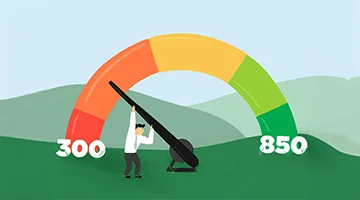Why is My Credit Score Going Down When I Pay On Time?

It’s hard to overestimate the significance of those three numbers, a credit score, for financial well-being. Good credit is a plus if you are searching for a new apartment, buying a new car with a loan, or want to improve your financial situation. But here is the twist. Sometimes, the credit score can fall even if one makes timely payments on their loans and bills.
Knowing the likely reasons can help you choose the right strategy and maintain your credit score in tip-top shape. Let’s explore what might cause a drop in a credit score even when the person has been paying their financial obligations as and when due.
Table of Contents
Why Did My Credit Score Drop? Main Reasons
Your payment history is not the only factor that affects your credit scores. The FICO credit score is calculated based on several aspects, which can be affected by your actions, leading to a sudden drop in this rating. Below are the main causes of the credit score decrease you probably didn’t see coming.
High Credit Utilization Ratio
Let’s say you have a credit card account with a credit limit of one thousand dollars. The credit utilization ratio is how much of that one thousand dollars you use. Thus, if $500 has been spent on that card, the utilization ratio is 50 percent.
Lenders use this indicator to determine whether a borrower is credit-responsible. If the credit utilization ratio is above 30%, one seems to be using credit products excessively, which is bad for lenders. They might think you need to be more relaxed and might even default on your loans.
The credit utilization ratio contributes towards formulating your credit scores to about 30%. If you are using most or almost all of your available credit, this can immediately impact your credit score.
Mistakes in Credit Report
If you wonder, “Why has my credit score dropped for no reason?” accidental errors may be a reason. Sometimes, the name, address, and Social Security number may be incorrect. Small mistakes that lenders and credit bureaus make can result in your report containing other people’s information. Although it’s rare, you can sometimes find accounts you never opened. This may happen when a lender reports wrong information, or you become a victim of identity fraud.
Sometimes, the same account may appear in your credit report several times, making you think that the actual amount of debt is higher than it is. Payments that were made on time can be filed as late payments. If there are errors, they must be disputed.
Identity Theft
Identity theft is one of the most vicious types of fraud where somebody unscrupulous obtains your identification numbers, bank accounts, credit card numbers, or other personal details. Thus, they may create new accounts or take out loans in your name. This can be a big problem because it all looks like you don’t meet your obligations or manage your finances improperly. All these activities can substantially lower your credit score in no time.
When the fraudsters open an account, use the money, and don’t pay, these records appear on your credit report and negatively impact your credit score. Credit limits have reached the last penny, and new loan applications also have the potential to drag the score down.
Be on the lookout for anything suspicious. Check for accounts or addresses you have never heard of. Review your credit reports to detect any oddities as soon as possible to avoid stress and ensure your credit score will not suffer due to activities you don’t perform.
Someone Used Your Credit Card
You may have included a relative or a friend as an authorized user on your account to improve their credit status. The pitfall is that such users can make purchases with your card as if it was their own, but you remain responsible for paying the bills. Teenagers, in particular, may purchase impulsively and need to remember they have done so. A user who intended to buy a few items may also make a large purchase you haven’t expected.
Another scenario is losing your wallet and someone grabbing your card details without your consent. The scammers are ingenious, and you may only realize it one day: you find yourself billed for something you did not order, which costs quite a lot of money.
Co-signing a Loan or Credit Card
Signing for someone is about lending a hand to the other party to increase their chance of loan approval. This way, you will be responsible for repaying the loan if the other person cannot do this.
When you sign for someone, this new account will appear on your credit report and affect your credit utilization ratio. Additionally, the application involves a ‘hard’ inquiry on both parties’ credit reports, which normally lowers the credit rating. Another pitfall is that a primary borrower may lose their job or experience emergencies that hold them back from paying back their debts on time.
Therefore, you must ensure the primary borrower is reliable before becoming a co-signer. If something has happened and you view unpaid cosign debt, it will be wise to make the payment yourself. It may be inconvenient, but having a good credit score is preferable.
You Applied for New Loans
The provider will look for your credit score whenever you complete a credit card or loan application. This kind of check is referred to as a “hard” inquiry. Each hard inquiry may reduce your credit score by up to 5 points. If many hard checks have been made quickly, your score will reduce dramatically.
Additionally, it can seem like you are in urgent need of money. Lenders will think it is risky to lend to you as you experience financial difficulties.
Closed an Old Credit Card
Your credit mix is the variety of credit accounts you have, like credit cards, loans, etc. Lenders love seeing a nice mix because it shows you can responsibly handle different types of credit. When you close an old credit card, you make that mix less diverse, which can make you look riskier.
Length of credit history is another biggie. This factor considers how long your accounts have been open. An older account is like a gold star on your credit report, showing you’ve been in the game for a while and (hopefully) handling your credit well. Therefore, closing it can result in a lower credit score.
If you can, keep those old credit cards open, especially if they have a low balance. Not only does this help maintain your credit mix and the length of your credit history, but it also keeps your utilization ratio in check.
Paid Off a Loan
Though having one less debt over your head is always good, most closed accounts can influence your credit mix and your credit history length. The influence is most often short-term. Yes, your credit rating may decrease initially, but later, when you have paid off a loan, the advantages will outweigh the disadvantages.
You are proving that you can manage and pay off debts, which is positive for the lenders in the long run. As time passes, your score comes back and may even go up as your good habits begin to pay off and show on your credit report.

How to Recover from a Credit Score Drop?
You can increase your credit score after all the problems you’ve faced, but it won’t happen overnight. Here’s the lowdown on how to bounce back:
- Check Your Credit Report: Discover why your score was reduced first. Request and review copies of your credit reports from the three credit bureaus currently operating: Equifax, Experian, and TransUnion.
- Address Any Mistakes: If there is any error in the report’s information, you should challenge it as soon as possible. Sometimes, lenders make inexplicable mistakes that can greatly affect your score if not fixed.
- Pay Your Bills on Time: This one may be self-explanatory, but take it seriously. Failure to make payments before the due dates is among the reckless ways to worsen your score. Consider using alerts and auto-pay.
- Reduce Your Credit Card Balances: This shows that high credit card balances compared to the credit limit hurt your rating. Your credit use should be below 30 percent of your overall credit limit.
- Don’t Close Old Accounts: Closing your old credit cards, even if they are not regularly used, will decrease the length of your credit history and negatively affect your credit score. Do not close your old credit cards, even if they are not regularly used, so that your credit score shows a longer account history.
- Limit New Credit Applications: Each time you apply for new credit, lenders pull a hard credit check, which slightly dents your score. It is better if you avoid applying for loans frequently and only request the amount you really need.
- Be Patient: You cannot get an actual credit wizard and have your score changed in a snap. It will take some time before the habits you build show up in the score. Just stick to your financial plans and wait.
Conclusion
Your credit score can decrease because of many known or unknown reasons. You were occasionally late for a payment, underwent a credit check, opened one or two new accounts within a short time, or became a victim of identity theft or credit report mistakes. But don’t stress it too much. You can still be in control of your credit status.
Your credit report should be observed regularly. This will help you find any fraudulent actions on time and stop them. Whether it is a blunder or a malicious manipulation, you should not let it go on and go further into a mistake that could hurt your score.
Also, remember the golden rule: building credit is like growing a tree with money. Although it requires some effort and patience, it will pay off in the future. Strong credit is your “golden ticket”, your pass to attaining affordable interest rates, favorable terms, and promos that can’t be obtained with a low score.
See also:
- Everything You Need to Know About Your Loan Balance
- How to Get Out of a Payday Loan Legally
- How Long Do Derogatory Marks Stay on Credit?
References:
